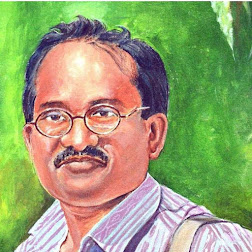barasala ( Telugu)
6:14 PM
EKUSIA [ଏକୁସିଆ]
Every human birth got a series of celebrations in its lifetime, at every stage of its development. In Odissa we got a very special kind of ritual that is celebrated by the Oriyas on twenty-first day from the date a baby takes birth. This function is known as Ekusia. It is a celebration to express the jubilation of the family when it get blessed with a new born baby.
Ekusia is conducted by the paternal grand-parents of the newborn baby. The maternal grandparents are invited to participate along with the family members. The maternal grand-parents gifts new set of cloths and ornaments to be wore by the baby for this day. It is on ekusia the namakaran or the name initiation ceremony is conducted. The father of the new born whispers the name twice on the right ear of the baby.
Though it is conducted on the twenty-first day from the date of child’s birth, but in case the 21st day happens to be in-auspicious either because of Sankranti or amavasya (let solar or the lunar eclipse) than ekusia could be conducted the day following.
On 22nd Aug 2011 the ekusia function of Ayushman, the son of Sh.Prakash Kumar Tripathy of Barpali was celebrated as par the ethnic Oriya culture. On this day Satyanaryana puja was conducted with ardent devotion to appease the Lord of the Universe i.e. Vishnu to pour blessings on the new born. A very special kind of sweet i.e. Sirni was prepared for this occasion to be offered as bhog to the lord. Sirni was prepared with atta or the wheat-flour along with jaggery. These long brownish chips gathered lascivious attention from every beholder for its looks and the aroma. Along with it the Lord Satyanaryana was served Manbhog, which too was prepared with atta, where as it was in the dust form.
It was followed by a feast at noon for the well-wishers of the family at Dharamshalla. First the bhog (Sirni and Manbhog) was served in hand. It was followed by rice, dal, khata, mixed vegetables with panner, allu putal, chips and finally khir with rasgola.
Basically ekusia is observed to purify (called sudhi) the household, where a baby had taken birth. For these long twenty days after a baby’s birth, the male members of the family are debarred from getting a hair-cut or a shave or from cutting the nails. And no religious activities like puja or the prayer to be made at home. Every piece of cloth at home need to be washed only by the washer-man. Wherever feasible the whole house is white washed. While in the villages the earthen floors of the household are spread with cow-dung to purify the surrounding. Observing Saucha or Sudhi for eleven days is stringent, if the family members can’t follow it for the long twenty days.
Ekusia is just a stepping stone in the life of a new born baby. And this author is looking for many more invitations that will follow it in its life time, like brata-upanayana, nirbandha, bibaha and so on.
Related Posts : BHAT KHUANI, ଭାତ ଖୁଆଣି [ANNA PRASANA]
Acknowledgement: Inputs and tips on this topic provided by the astrologer Sri Saroj Dash [cell # +919937120508] and
Pandit Sri Hemanta Mishra
[Cell # +919937539219]
With Best Complements from :
WhatsApp# +918249314972
E.KIRAN MOHAN(The Writer)
Tahsil Chowk
At\PO - BARPALI - 768 029
Dist. Bargarh
Orissa, India


















![EKUSIA [ଏକୁସିଆ]](http://2.bp.blogspot.com/-IVkk6zhpWdY/UDDbYrQcj3I/AAAAAAAABP8/d0814kzOx4Q/w72-h72-p-k-no-nu/Ekusia.jpg)

